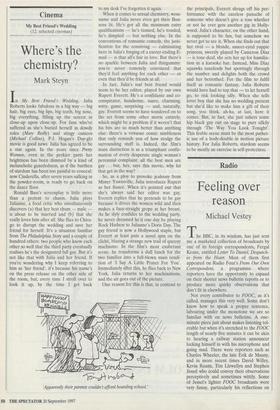Cinema
Where's the chemistry?
Mark Steyn
n My Best Friend's Wedding, Julia Roberts looks fabulous in a big way — big hair, big eyes, big lips, big teeth, big nose, big everything, filling up the screen in close-up upon close-up. For fans who've suffered as she's buried herself in dowdy roles (Mary Reilly) and stingy cameos (Michael Collins), P.J. Hogan's Day-glo movie is good news: Julia has agreed to be a star again. In the years since Pretty Woman, even in the perkier parts her brightness has been dimmed by a kind of melancholic guardedness, as if the burthen of stardom has been too painful to conceal: now Cinderella, after seven years sulking in the powder-room, is ready to go back on the dance floor.
Ronald Bass's screenplay is little more than a pretext to charm. Julia plays Julianne, a food critic who simultaneously discovers (a) that her best chum — male is about to be married and (b) that she really loves him after all. She flies to Chica- go to disrupt the wedding and save her friend for herself. It's a situation familiar from The Philadelphia Story and a couple of hundred others: two people who know each other so well that the third party eventually realises he's the designated fall guy. But it's not like that with Julia and her friend. If you're wondering why I keep referring to him as 'her friend', it's because his name's on the press release on the other side of the room, but, every time I stroll over to look it up, by the time I get back to my desk I've forgotten it again.
When it comes to sexual chemistry, woss- name and Julia never even get their Bun- sens lit. He's got all the minimum entry qualifications — he's tanned, he's tousled, he's dimpled — but nothing else. In the conventions of romantic comedy, the justi- fication for the conniving — culminating here in Julia's forging of a career-ending E- mail — is that all's fair in love. But there's no sparkle between Julia and thingummy: you're never remotely convinced that they'd feel anything for each other — or even that they'd be friends at all.
In fact, Julia's real best friend would seem to be her editor, played by our own Rupert Everett. He's a confidante and co- conspirator, handsome, suave, charming, witty, game, surprising — and, naturally, gay. Everett seems to have wandered on to the set from some other movie entirely, which might be a problem if it weren't that his bits are so much better than anything else: there's a virtuoso comic nimbleness that only reminds you of how stodgy the surrounding stuff is. Indeed, the film's main distinction is as a triumphant confir- mation of every desperate single woman's perennial complaint: all the best men are gay . . . but, hey, says this movie, why let that get in the way?
So, as a ploy to provoke jealousy from Mister Yawnsville, Julia introduces Rupert as her fiancé. When it's pointed out that she's always said her editor was gay, Everett replies that he pretends to be gay because it drives the women wild and then makes a faux-straight grope at her breast. As he slyly confides to the wedding party, he never dreamed he'd one day be playing Rock Hudson to Julianne's Doris Day. The gay friend is now a Hollywood staple, but Everett at least puts a novel spin on the cliché, blazing a strange new trail of queeny machismo. In the film's most exuberant scene, he transforms a dull lunch for the two families into a full-blown mass rendi- tion of 'I Say A Little Prayer For You'. Immediately after this, he flies back to New York, Julia returns to her machinations, and the air goes out of the picture.
One reason for this is that, in contrast to
Apparently their parents couldn't afford boarding school.'
the principals, Everett shrugs off his per- formance with the careless panache of someone who doesn't give a toss whether or not he ever gets another gig in Holly- wood. Julia's character, on the other hand, is supposed to be fun, but somehow we never get to see it. When she finds out that her rival — a blonde, saucer-eyed yuppie princess, sweetly played by Cameron Diaz — is tone-deaf, she sets her up for humilia- tion in a karaoke bar. Instead, Miss Diaz squawks tunelessly but sportingly through the number and delights both the crowd and her betrothed. For the film to fulfil itself as romantic fantasy, Julia Roberts would have had to top that — to let herself go, to risk looking silly. When she tells lover boy that she has no wedding present but she'd like to make him a gift of their song, you think, ah-ha, at last, here it comes. But, in fact, she just ushers some hip black guy out on stage to purr silkily through 'The Way You Look Tonight'. This feeble scene must be the most pathet- ic use of a body-double in motion picture history. For Julia Roberts, stardom seems to be mostly an exercise in self-protection.


































































 Previous page
Previous page